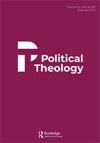John Locke on Reading the Bible: Rational Obscurity and the Lockean “Rule”
IF 0.4
0 RELIGION
引用次数: 0
Abstract
ABSTRACT This essay resists the tendency to separate Lockean reason from revelation, and his political concerns from his Christian theology. Rather than a repudiation, in significant ways, Locke’s Paraphrase and Notes on the Epistles of St. Paul is the application of his methodological or hermeneutic approach to reading scripture laid out in the Essay Concerning Human Understanding. While the fundamental articles of Christianity were “plain” and “clear” in the gospels, requiring minimal interpretation, far more labor was required to render Paul’s sense “plain” and “clear.” Rather than a simplistic notion of doctrinal minimalism, Locke’s Christianity amplified order, duty, and obedience. It is his commitment to the interdependence of faith and reason which grounds Locke’s conviction that expressions of faith contrary to reason and destructive of civil order exceeded the bounds of legitimate religious expression.约翰·洛克谈读经:理性的朦胧与洛克的“规则”
摘要本文抵制将洛克理性与启示分离的倾向,抵制将洛克的政治关切与基督教神学分离的倾向。洛克的《圣保罗书信释义》在很大程度上不是一种否定,而是他在阅读《关于人类理解的散文》中所阐述的经文时运用了方法论或解释学方法。虽然基督教的基本条款在福音书中是“朴素”和“清晰”的,需要最少的解释,但要让保罗的感觉变得“平淡”和“明确”,需要付出更多的努力。洛克的基督教不是简单的教义极简主义概念,而是放大了秩序、责任和服从。正是他对信仰和理性相互依存的承诺,使洛克坚信,违背理性和破坏民事秩序的信仰表达超出了合法宗教表达的范围。
本文章由计算机程序翻译,如有差异,请以英文原文为准。
求助全文
约1分钟内获得全文
求助全文

 求助内容:
求助内容: 应助结果提醒方式:
应助结果提醒方式:


